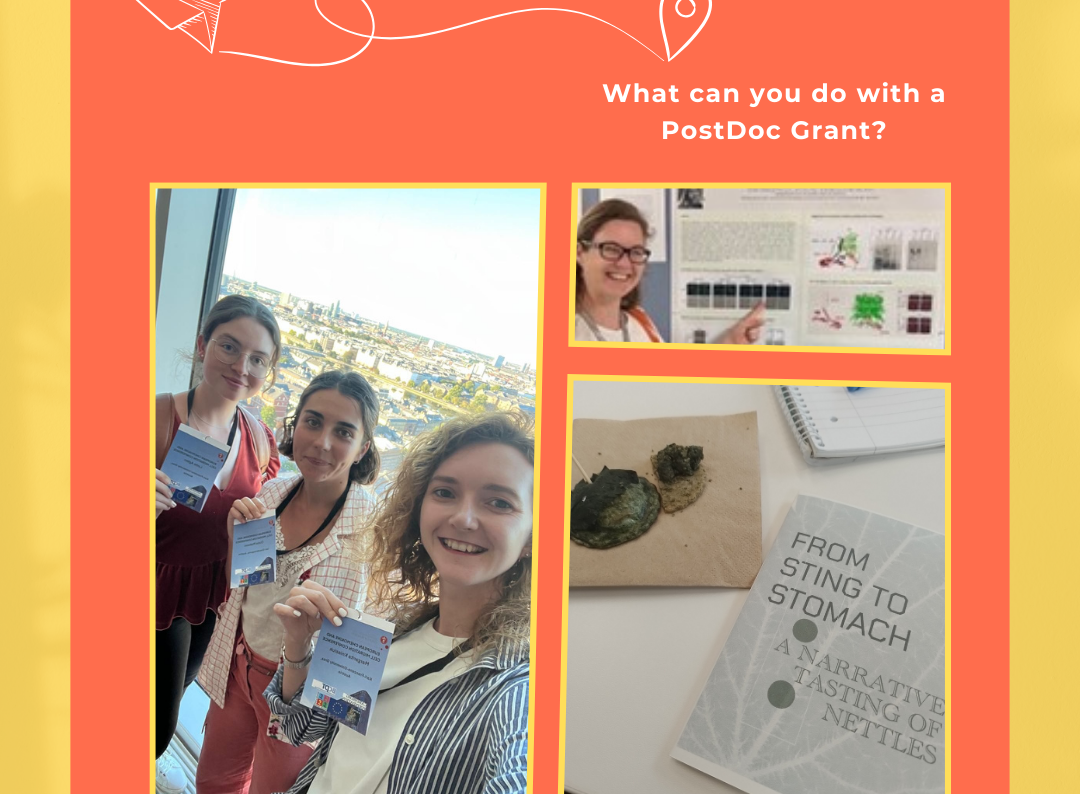What do our researchers get up to when they are away from their offices at University of Graz? We've asked them to provide us with some travelogues of the research activities we have funded.
Enjoy their reports below, they sound like fantastic experiences!
Heide Bruckner exploring creative geographies in Birmingham
Good timing, because I just returned to the office today! I just returned from the Royal Geographical Society (with IBG)’s annual conference in Birmingham, UK, supported by the PostDoc travel grant.
Through the conference theme of ‘creative geographies’, I both presented and attended inspiring panels, workshops and activities on food/environment relations.
I pulled a heavy rock in a trolley around campus, learning about the geological history of ‘erratic boulders’ with the West Midlands artist cooperative Walkspace (https://walkspace.uk/). I felt, tasted, and described stinging nettle through a workshop on decolonizing food with Rae Hoppolyte of Folxfarm (https://folxfarm.org/).
My own presentation, about sensorial dimensions of environmental justice in the Pacific Islands, is now slated to become part of an edited book on pluralizing environmental justice. The network with not only British but also other international geographers is so important to build, especially when based in a ‘smaller’ country like Austria. Many thanks for the financial support to attend the RGS/IGB conference!
Margarita Kniaziuk connecting with experts in chemokine research in Copenhagen
After changing research fields, an important milestone for me was participating in the European Chemokine and Cell Migration Conference at the University of Copenhagen.
The opportunity to connect with experts in chemokine research gave me a clearer understanding of the scope and emerging directions of the field. Presenting my ongoing work on the CXCL14 chemokine at the poster session also allowed me to receive valuable feedback that will inform my next steps.
Some key insights I took away:
- single-molecule glycan imaging is now feasible (talk by Rebecca Miller) → opening the door to the precise mapping of chemokine–GAG interactions
- chemokines share a very small conserved structural scaffold (~3% of sequence), while the remainder drives receptor selectivity (talk by Brian Volkman) → an improved framework for rational drug design
- ticks evade detection by producing evasins that block multiple chemokines simultaneously → a strategy we can now repurpose to treat inflammatory diseases (talk by Shoumo Bhattacharya)
P.S. The PhD students from my group – Lotte Agten and Clara Matteini are on the first picture
Natalia Kulminskaya exploring Madrid’s streets and entertaining ways to explain molecular events
I attended the EMBO EMBL Yeast Conference 2025 in Madrid, where I presented a poster on our project about the AAA+ ATPase Rix7 and its interaction with Mak16 during ribosome biogenesis. This work was initiated under supervision of Valentin Mitterer, and I was excited to present our results.
It was a unique opportunity to share these findings with an international community of yeast researchers and to receive valuable feedback from experts in the field. The conference also allowed me to connect with potential collaborators and broaden my scientific network, which is very important for my development toward independence.
Presenting at such a high-profile meeting gave visibility to our work and strengthened my confidence in communicating complex ideas across disciplines. I gained new perspectives on ribosome assembly dynamics, which I will integrate into the next steps of our project. In addition, I learned about cutting-edge methods such as time-resolved cryo-EM, which will inspire my future research.
A fun and memorable moment was when a speaker illustrated the dynamic elements of ribosome biogenesis with references to a bull-riding rodeo movie - a surprisingly entertaining way to explain molecular events!
Exploring Madrid’s historic streets made the whole experience even more enjoyable.
Tobias Eibinger exploring Danish register data and building connections in Copenhagen
In late June and early July 2025, I visited the Copenhagen Business School, following an invitation from Assoc. Prof. Ismir Mulalic (Department of Economics).
The purpose was to establish a collaboration with Ismir and work with him on Danish register data on a project about occupations, firm wage premia, and the gender pay gap.
This builds on theoretical and simulation work that Riccarda Rosenball (University of Graz) and I had already developed, and the Danish data provide the detailed occupational information we need to bring the idea to real-world evidence.
Because we gained access to the data right away, the collaboration proved highly productive, and we were able to make rapid progress with first results already during the stay. The collaboration continues, with Ismir visiting Graz in November to give a talk and work further on the project in person.
The research culture at CBS was very open and collaborative, which made the visit both efficient and enjoyable. Outside the university, it was striking to experience Copenhagen at a time when the city has overtaken Vienna as the world’s most livable city, largely thanks to its climate resilience.
And as a fun anecdote: during a walk in heavy rain, we saw the Little Mermaid completely alone, a rare experience in one of the city’s most visited spots.
Apply for a micro-grant provided by the Research Careers Campus (for postdocs, PhD researchers, and mid-career scholars): https://research-careers-campus.uni-graz.at/de/services-funding/ - next deadline is October 15!
Picture credits: Heide K. Bruckner, Natalia Kulmniskaya, Margarita Kniaziuk, alle privat.
